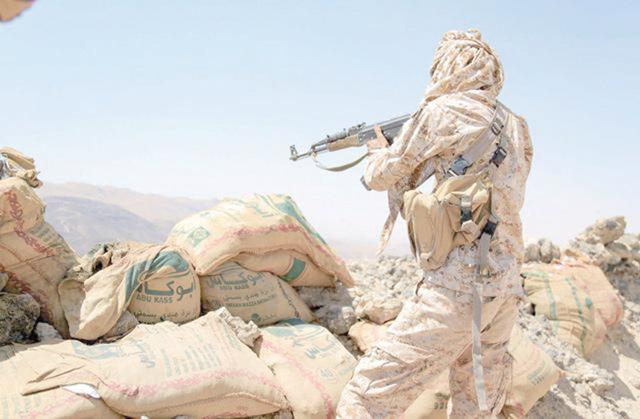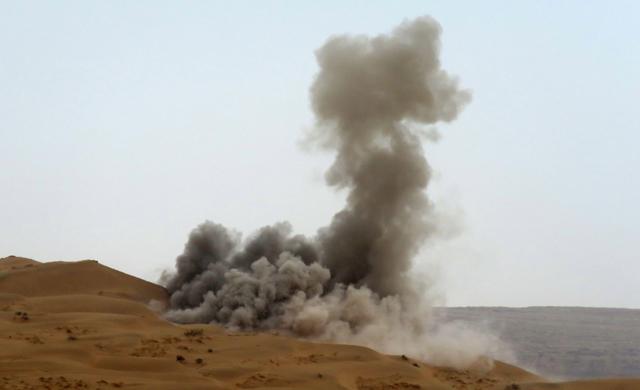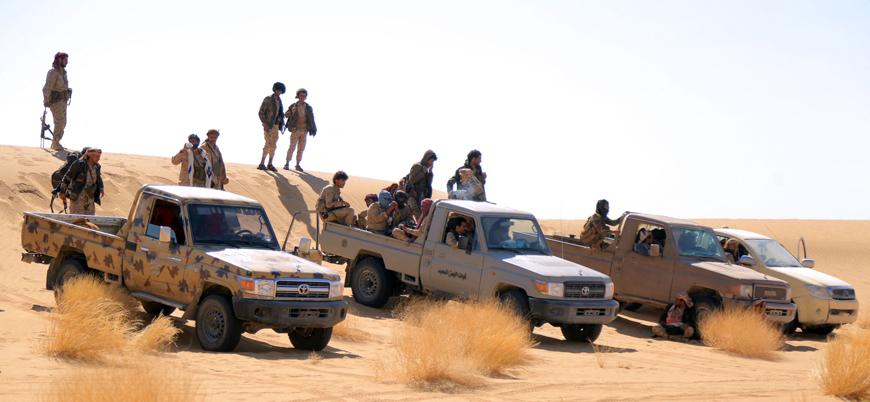You are here
Yemen insurgents seize vessel in latest escalation
By AFP - Jan 03,2022 - Last updated at Jan 03,2022

A fighter loyal to Yemen's Saudi-backed government mans a position near the frontline facing Iran-backed Houthi rebels in the country's northeastern province of Marib, on October 17, 2021 (AFP photo)
RIYADH — Yemeni insurgents have seized an Emirati-flagged vessel in the Red Sea, the insurgents and a Saudi-led coalition said on Monday, giving contrasting explanations for the latest escalation in a seven-year war.
The coalition, fighting in support of Yemen's internationally recognised government, said the vessel was carrying medical supplies but the insurgents said they seized "a military cargo ship with military equipment".
The coalition has been fighting for nearly seven years in support of Yemen's government against the Iran-backed Houthis, in a conflict that has displaced millions and created the world's worst humanitarian crisis, according to the United Nations.
"The militia must promptly release the ship, or the coalition forces will undertake all necessary measures and procedures to handle this violation, including the use of force if necessary," coalition spokesman Turki al-Malki said.
In a statement cited by the official Saudi Press Agency, he said the vessel was travelling from Yemen's Socotra island, off the country's south coast.
It was returning to the Saudi city of Jazan carrying medical supplies after finishing a mission to set up a field hospital on the island, Malki said.
"The boat named Rawabi, bearing the flag of the United Arab Emirates, was pirated and kidnapped at 23:57 (2057 GMT) Sunday while off Hodeida province," he said.
Malki was unable to confirm the number of people on board when contacted by AFP. There was no immediate comment from the United Arab Emirates.
'Hostile acts'
The Huthis confirmed they had seized an Emirati-flagged vessel in the Red Sea but their military spokesman Yahya Saree said it had "entered Yemeni waters without authorisation" and was carrying out "hostile acts".
Saree tweeted: "The successful and unprecedented operation is part of the fight against [coalition] aggression."
Fighting has intensified over the past few weeks in Yemen, the Arabian Peninsula's poorest country.
The Houthis come from the minority Zaidi Shiite sect of Islam and fought six previous wars against Yemen’s then-government between 2004 and 2010. But the current conflict is also a battleground for the wider feud between regional powers Saudi Arabia and Iran.
UN special envoy Hans Grundberg last week said the uptick in fighting “undermines the prospects of reaching a sustainable political settlement to end the conflict in Yemen”.
Grundberg added: “The escalation in recent weeks is among the worst we have seen in Yemen for years and the threat to civilian lives is increasing.”
It is not the first time that ships have become caught up in the war.
In November 2019, for example, the Houthis acknowledged they had seized three ships, two South Korean vessels and a Saudi-flagged tug, in the Red Sea a few miles off Uqban island, north of Hodeida.
In July 2018 the kingdom accused the rebels of attacking two Saudi-operated oil tankers in the Red Sea. The pro-Houthi Al Masirah television said that the rebels had targeted a Saudi warship named Al Dammam, without providing further details.
Other ships have been seized in recent years in regional waters, with most incidents blamed on Iran. Tehran and Washington, a close ally of Saudi Arabia, regularly accuse each other of aggressive acts at sea.
On December 25 the coalition launched a “large-scale” assault on Yemen after missiles fired by the rebels killed two people in the kingdom, the first such deaths in three years.
In November the rebels took control of a large area south of Hodeida, a key Red Sea port where the warring sides agreed on a ceasefire in 2018, after loyalist forces withdrew.
Efforts by the UN and United States to end the conflict have so far made little progress.
In late November the United Nations said the war would have killed 377,000 people by years’ end, both directly and indirectly through hunger and disease.
Related Articles
RIYADH — A Saudi-led military coalition on Saturday accused Yemeni rebels and their Iranian backers of using two Red Sea ports for military
SANAA — Yemen's Huthi insurgents on Saturday rejected a UN request to release an Emirati-flagged vessel they seized earlier this month, sayi
TEHRAN — Iran on Monday dismissed as "invalid" Israel's accusations that Yemen's Huthi rebels were acting on Tehran's "guidance" when they s

















